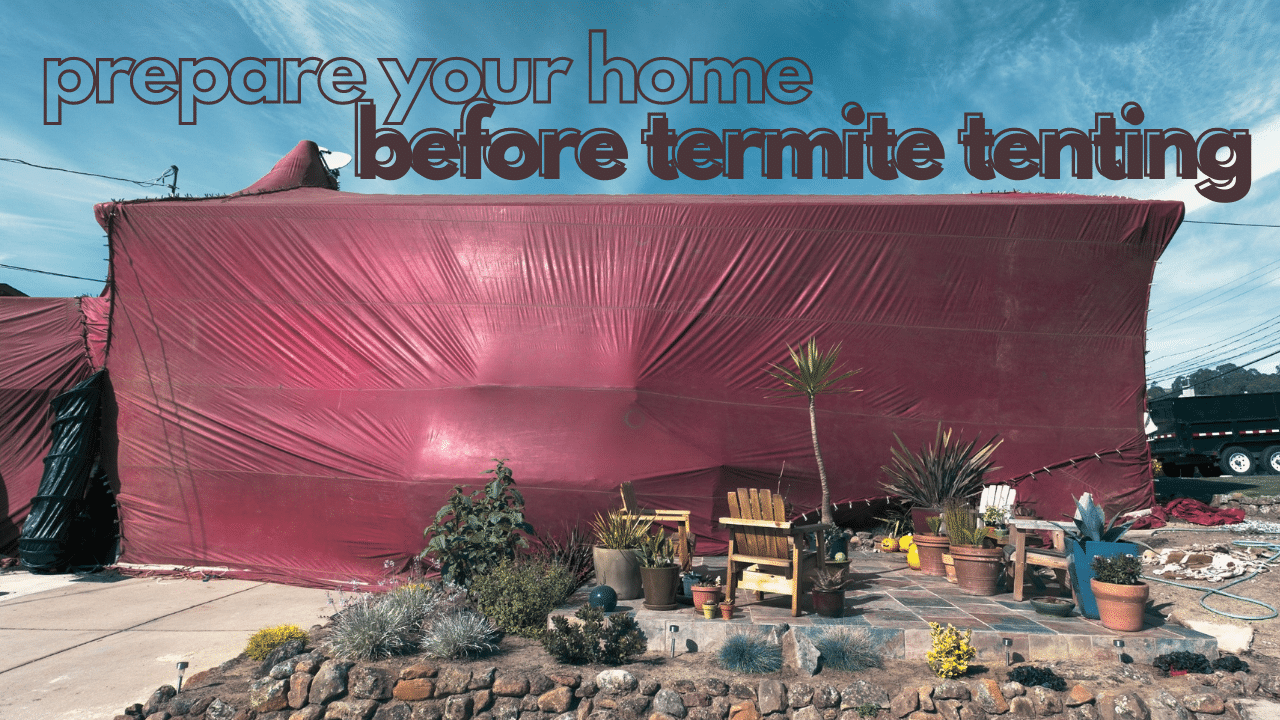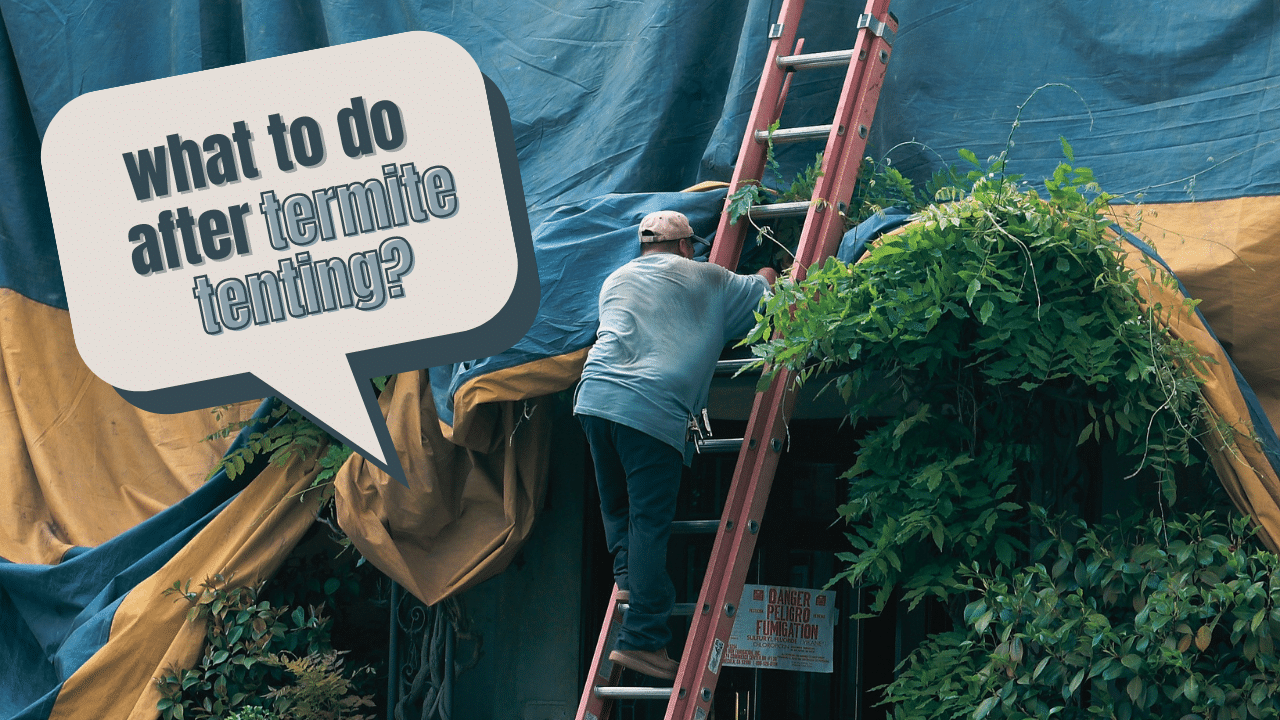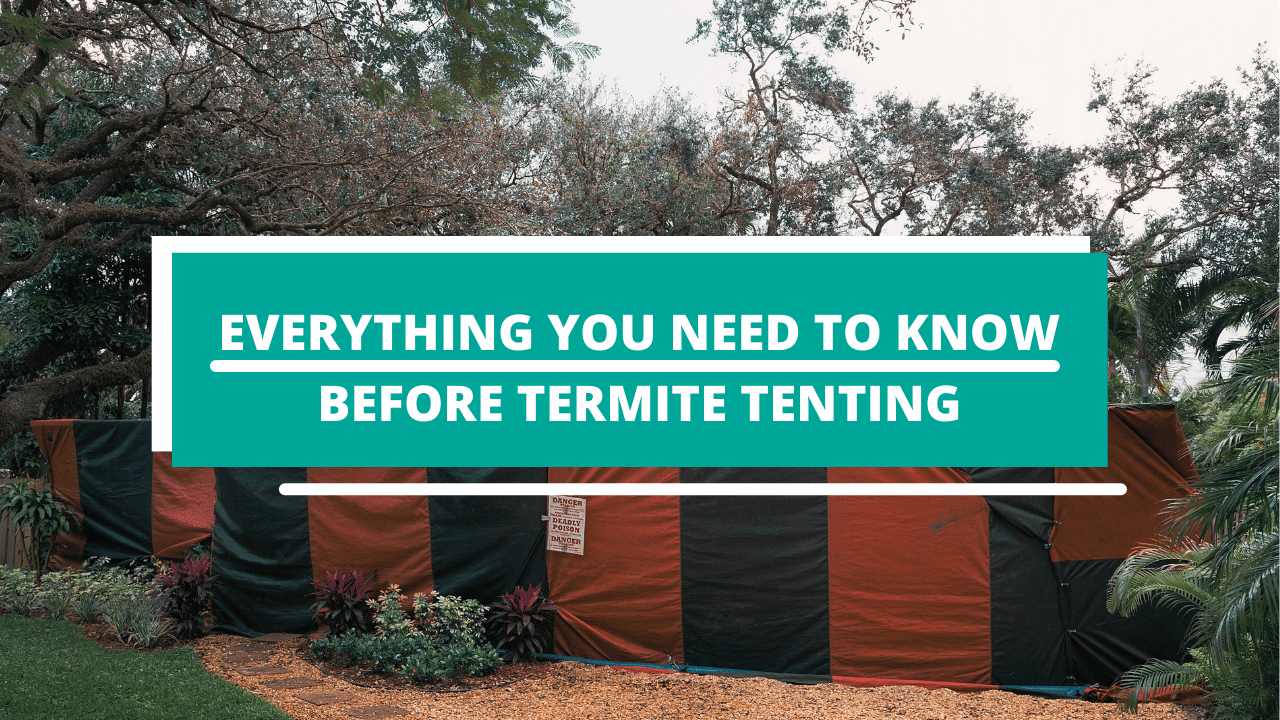In this guide, we'll cover everything you need to know on how to prepare your house before and after Termite Tenting!
Termite tenting is a useful way of dealing with termites at home. If not dealt with properly, these tiny, invisible creatures can wreak complete havoc and destroy your precious home. Even though you’ll have pest control professionals treat the termite-infested area, you must prepare your home for fumigation before the process begins.

Tips to Prepare for Termite Tenting
Termite tenting is the most potent treatment option when it comes to getting rid of termites at home. In this article, we’ll go over 12 tips on how to prepare your home before and after the fumigation is complete.
Did you know that your home will be under a tent and you’ll be requested to stay away for 24-48 hours? This is so the chemicals can work their magic and get rid of every last termite in your home. Make plans to stay with friends and family for at least three days, and before the fumigation process begins, pack yourself a small bag with all the essentials and keep it someplace safe (preferably your car) so that you don’t need to access your home once the pest control professionals get to work.
Before termite tenting begins, remember to get rid of all the perishable items from your home. This is especially valid for all the items in your pantry (including dog/cat food) and refrigerator. One way of doing that is by not going grocery shopping a week before the pest control professionals are called for fumigation. This will ensure that you don’t end up throwing out perfectly good food, or if you have a storage area outside your home, you can place these items there for the time being. Think of it as an opportunity to use all the stocked-up ingredients (yes, we’re talking about cans of pumpkin puree that you bought months ago and still haven’t used any).
You don’t want the strong chemical smell to seep into your clothes after the fumigation. One way to avoid that is by placing all your clothes, curtains, bed linen in bags, and double-sealing them so that their contact with chemicals is negligible.
Remember to take out all your indoor plants and place them safely outside. Make sure that they are placed at a safe distance from the entrance of the house so that the pest control professionals can move in and out of the house without any kind of hindrance.
Before the fumigation service begins, we suggest you turn off the gas. If you need to make a call and schedule a temporary shutoff, make sure you give the exact dates (this will also include the days when you’ll be staying away from home after the fumigation). If you can turn off gas manually, please do that as it’s not the pest control professional’s job to turn off utilities such as this in your home.
Whether it’s your microwave, refrigerator, ovens, water heaters, or any other electrical appliances, remember to turn it off before the pest control specialist shows up at your doorstep. Speaking of refrigerators, if you have food lying inside, please make sure you either give it to your friends or get rid of it because you don’t want to come back home with your refrigerator reeking of rotten food smell.
If you’ve covered your furniture with plastic covers (or never removed them when you purchased them), remember to remove them before the fumigation begins. This will ensure that the termite tenting process covers every nook and corner, and by removing the plastic covering, you’re ensuring that termites are completely exposed to the chemicals and don’t have a hiding place.
The pest control specialists will need to fumigate every surface area of your house. Therefore, you must leave all the drawers, cabinets, and cupboards open so that it’s easy for them to spray chemicals. If you’ve locked certain cabinets and drawers, remember to unlock them well in advance so that you’re not scrambling for the right keys. Once the fumigation is complete, remember to lock the house and keep it sealed for the next 24-48 hours.
Whether it’s jewelry, silverware, or any other type of precious item, remember to place it somewhere safely (perhaps you could leave it at the hotel where you’ll be staying till the fumigation process is complete). You don’t want these precious items to come into contact with any of the chemicals as that may lead to oxidization.
Before signing a contract with the pest control service, ask them about the type of chemicals they’ll be using. Do your research in advance so you know if these chemicals could harm you and your family in any way, especially if you have a family member with asthma, pulmonary fibrosis, or any other type of respiratory issues.

Things to do After the Fumigation Process is Over
Now that termite tenting is complete, let’s go over some of the things you must do after the fumigation process is complete:
The first thing you’ll notice is the smell of chemicals when you enter your home after the fumigation process is done. Remember to wash all the dishes, bed linen, and clothes (including those that were kept in bags and double-sealed). Wipe all the surfaces with disinfectant including kitchen counters, shelves, and cabinets before placing food items on them. You can even wipe the doors and closets to make sure you and your family aren’t exposed to any of the chemicals directly.
Even though the pest control experts will remove the tent after 24 hours and check the air quality of your home on that day, it’s essential to air your house by opening all the doors and windows to get rid of the chemical droplets suspended in the air. If you have an air purifier, we suggest you turn it on so that the air is nice and clean when you and your family move back into the house. Also, remember to wash all your linen to ensure that you don’t sleep in any of the chemicals. This includes your bed linen, pillowcases, and comforters.
Termite Tenting: Frequently Asked Questions (FAQs)
The entire process takes anywhere between eight hours to five days. Once the pest control specialist places a tent over your house, they will begin the fumigation process by releasing chemicals into all the crevices and nooks in your house. Once the termites are exposed to these chemicals, it will impact their nervous system and lead to immediate death. Once this process is complete, the pest control expert will remove the tent and allow the house to breathe. This will take approximately 48 hours. It’s important to leave the house as it is for another day or two before you move in and begin the cleaning process. If you’re planning to stay at a hotel, we suggest you make the reservation for at least 3-4 nights until the entire fumigation process is complete. (Related: How Long Does Termite Treatment Last?)
Termite tenting is a necessary process if there is severe termite infestation in your house. The only downside is that you will have to move out of your home for a few days and clean it properly once the fumigation process is done. But that minor inconvenience shouldn’t deter you from calling a pest control specialist as termites can be a serious health hazard for you and your family.
As long as you hire pest control experts who have gone through extensive training and know exactly how to conduct the treatment process safely and properly, termite tenting is perfectly safe. This treatment process will ensure that your home is protected from these invisible creatures called termites.
You must go over all the proper steps once the fumigation process is complete. The first thing your pest control specialist will do is check the air quality of your home to check the toxicity dissipation caused due to fumigation. Once you get a clearance from the fumigator that it’s safe to enter the house, you can begin the process of cleaning and settle in. While cleaning, remember to disinfect all the surfaces of your home, especially your kitchen counters where you’ll be cooking. You may even hire a professional cleaning service to ensure that your home is spotless and that there is no chemical residue anywhere in the house.
Final Thoughts
Termite tenting will ensure that your home is safe and termite-free. Pest control specialists will also give tips on how to avoid termite re-infestation. Termite tenting can seem daunting at first, but with proper guidance and care, it can be a seamless experience for you and your family!

